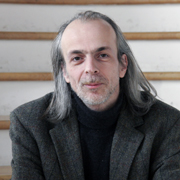Over three extraordinary days, three East German cities will play host to three unique world premières
Although these works share an orchestral design – and will be played by three of Germany’s most prestigious orchestras – they each point to very different musical worlds that evoke the past, present and future in unique ways
Looking to the past, Colin Matthews’ work Grand Barcarolle draws us into the realm of Beethoven. It responds to a challenge set by Riccardo Chailly: to compose a companion piece to Beethoven’s Eight Symphony. As Matthews writes:
‘My starting point for this piece was the fanciful thought of Beethoven returning to his Eighth Symphony 200 years later and realising that he had forgotten to write a slow movement. Not that there is any implication that this Grand Barcarolle could be inserted into the Eighth Symphony - stylistic considerations aside, that would be a pointless exercise. But I began by working with elements of the symphony, as well as of the roughly contemporary piano sonatas Op. 81a and 101, and composing some Beethoven pastiche of my own. This material was largely submerged in the process of composition, and I found to my surprise that another composer was coming to the surface: the first draft was in fact completed on the 100th anniversary of Mahler's death. So perhaps appropriately a centenary as well as a bicentenary is commemorated here… Why a barcarolle? Largely because Beethoven never wrote one, so there would be no invidious comparisons : though had he done so it would surely have been a Grosse Barcarolle.’ (Colin Matthews)
Just as Matthews’ piece reimagines the past through a contemporary lens, the music of Torsten Rasch combines past and present in a unique aesthetic:
‘Rasch’s characteristic dialogue of past and present, self and other, again makes something new out of a journey into several histories, and at the same time shows the past too in a different light, talking back to its ghosts with bristling confidence.’ (John Fallas)
Rasch’s Wouivres does just this. Its four movements are a reminder of the traditional symphonic structure – introductory, slow, fast, summing up – but its harmonic material is part of a different, more cyclical journey, with the same harmonic progression constantly reappearing in different contexts. This all-pervasive progression which threads throughout the piece is the Wouivre of the title, a celtic expression which has at least four meanings:
1) A snake that glides
2) A river that snakes through the landscape
3) A telluric current that snakes underground enriching both earth and mankind, and finally
4) Currents that are termed cosmic or magnetic and which encompass everything.
The future – ‘cosmic’ but also manmade – is the subject of Jonathan Harvey’s Weltethos:
‘Wir haben Zukunft:
Wir Kinder haben Zukunft, wenn wir immer Menschen bleiben.
Menschen mit Vernunft und Herz…’
(We have a future:
We children have a future, if we always remain human.
Humans with mind and heart…)
This children’s refrain, penned by the radical theologian Hans Küng, punctuates the piece. In Küng’s philosophy international peace can only be achieved by a global ethical consensus. Such ethics, Küng argues, have already existed for thousands of years in the major cultures and religions of the world; the task only remains to unite them. This then is the motivation behind Weltethos, commissioned by Küng and structured around the teachings of six religious figures on six ethical topics:
Confucius on Humanity
Moses on the Golden Rule
Hindu scripture on Non-Violence
Mohammed on Justice
Buddha on Truth
Jesus on Partnership
Just as the text takes its influence from far and wide, so the music also draws on many different styles and cultures that reflect Harvey’s own mixed heritage: he was brought up as an Anglican chorister but has since been drawn to the religions of the ‘East.’ In the second movement, for instance, the trumpet stands in for the ram’s horn or Jewish ‘shofar’, and the woodwind glissandi hint at the ghost of klezmer. Or in the third movement, where the musical ideas alternate between the dancing of the Hindu god Nataraja and the yogic chanting of the chorus. Scored for speaker, larger chorus, children’s chorus and large orchestra (with a vast array of exotic percussion), Weltethos matches the grandeur of the text with music of an epic scale.
fm
(from [t]akte 2/2011)



